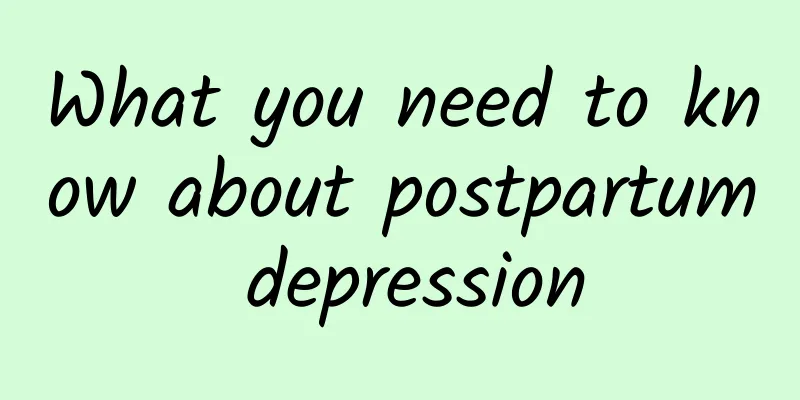What you need to know about postpartum depression

|
1. What is postpartum depression? Postpartum depression is a common psychological problem that occurs in about 80% of mothers. Common symptoms include low mood, lack of energy, sleep disorders, reduced self-worth, changes in appetite, etc. If it lasts for a long time, you may be suffering from postpartum depression. 2. Causes of postpartum depression 1. Influence of hormone levels: During pregnancy, the levels of estrogen and progesterone in expectant mothers increase, and the secretion of cortisol increases. These hormonal changes will make expectant mothers more sensitive to smells and the environment, and also help relieve fatigue. After delivery, these hormone levels drop sharply, which may lead to mood swings, fatigue, and worsening symptoms of depression after fatigue. If there are some external stimuli, such as family conflicts, work pressure, etc., it may induce postpartum depression. 2. Physical changes: After giving birth, many mothers will experience significant physical changes. They need to adapt to their new roles and bodies, and changes in body shape and appearance may make mothers feel lost and inferior. At the same time, the damage to the mother's body caused by pregnancy and childbirth cannot be recovered in a short period of time. During this process, the mother may feel anxious and depressed. 3. Family relationships: Mothers with postpartum depression often have higher requirements for family relationships. If family members cannot provide sufficient support, care and understanding, or if there is discord between the mother-in-law and daughter-in-law, these may become the fuse of postpartum depression. 4. Lack of security: Newborns have ever-changing living habits, and it is difficult to predict their needs and sleep time, which can put mothers in a state of stress and lead to a lack of security. Newborns cry frequently, often disturbing their mothers’ sleep day and night, which also makes mothers feel exhausted. 3. Symptoms of postpartum depression 1. Depressed mood: feeling unhappy and crying for no reason. 2. Lack of energy: feeling tired and weak. 3. Sleep disorders: insomnia or hypersomnia. 4. Decreased self-worth: Self-evaluation declines and one feels that one is worthless. 5. Appetite changes: loss of appetite or overeating. 6. Anxiety and tension: Often worrying about your baby’s health, and easily becoming nervous and uneasy. 7. Hallucinations and delusions: Some symptoms of hallucinations and delusions may occur. How to deal with postpartum depression 1. Seek support: The support of family and friends is very important. They can give care and understanding to the mother and help her through the difficult times. At the same time, you can also seek help from a doctor for psychological counseling and treatment. 2. Adjust your mindset: Correctly view the change in your role, learn about postpartum depression, and actively deal with possible psychological problems. At the same time, give yourself and your baby some time to adapt to the new life and role. 3. Relax your body and mind: You can relax yourself and your baby by listening to music, doing yoga, meditating, etc. These methods can help mothers relieve stress and anxiety. 4. Regular work and rest: Try to maintain a regular work and rest schedule and ensure adequate sleep and rest time. This will help the mother to recover her physical strength and energy. 5. Diet adjustment: A balanced diet with more vegetables, fruits and foods rich in vitamins can help alleviate mood swings. At the same time, you should also pay attention to controlling your diet and avoid excessive intake of sugar and other substances, so as not to aggravate mood swings. In short, postpartum depression is a common psychological problem, but it can be prevented and treated through correct understanding and positive coping methods. Both the mother and her family should understand the relevant knowledge of postpartum depression, give the mother enough care and support, and help the mother through this special period. |
<<: What is "interventional therapy"? What diseases are suitable for interventional therapy?
Recommend
Accurately fight against allergic rhinitis: start with allergen detection
Author: Zhao Jing, Chief Physician, Children'...
[Medical Q&A] What should you be alert to if you always use one hand to drag the other forearm after an injury?
Planner: Chinese Medical Association Reviewer: Sh...
Attention! Children's dry eye syndrome should not be ignored
Parents often bring their children to the ophthal...
Four principles of correct muscle training...
Simply put, our musculoskeletal system is made up...
Vulvar itching discharge bean dregs what is going on
Gynecological diseases are very disturbing to wom...
Get rid of "elephant legs" must know! 5 bad habits make legs thicker and thicker
1. Sitting for a long time Sitting in a chair all...
What to do if there is a foreign object in the vagina
For friends who have foreign objects in the vagin...
What causes dry and painful vulva?
Vulvar dryness, pain and itching are very trouble...
How to treat yellow-green leucorrhea
Many women become worried and anxious whenever ta...
Is the piano a keyboard instrument or a percussion instrument? What is the pedal under the piano used for?
The piano is a keyboard instrument in Western cla...
What is the cause of bleeding during intercourse four months after delivery?
We all know that expectant fathers and expectant ...
“Choose ingredients according to your needs” to see which Laba porridge is suitable for you?
Today is Laba Festival, and there is a tradition ...
Post-abortion care
Most people do not know how to take care of their...
Will milk knots disappear after weaning?
Now many mothers are in the breastfeeding stage. ...









